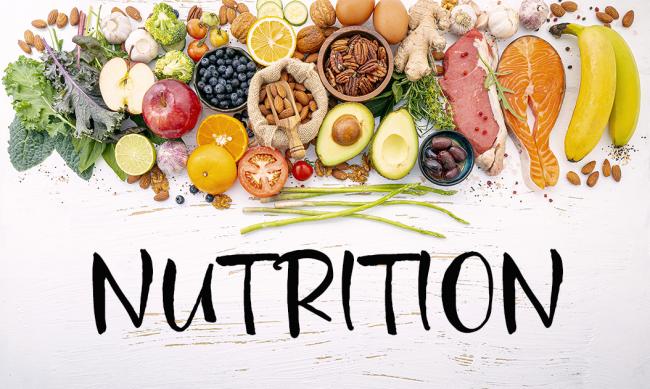
March is National Nutrition Month!
We all know “nutrition” and eating a “nutritious diet” is important…but what IS nutrition? And why is it important?
Nutrition is the study of food and how it affects the health and growth of the body.
Nutrients are substances found in foods that our bodies use to grow, reproduce and survive.
There are 6 major nutrients we get from food:
1. Proteins
- Proteins are important for growth and development. They also help your body repair tissue, carry oxygen, digest foods, and regulate hormones.
- Get proteins from meat, legumes (beans, peas, lentils), nuts, seafood, and eggs
2. Carbohydrates
- Carbohydrates (a.k.a. carbs) are used for energy. When you eat foods containing carbs, your body breaks these down into “glucose” (blood sugar) which your cells use for energy.
- Get carbohydrates from pasta, bread, rice, potatoes, cereals, fruit, milk, sugar
3. Lipids (a.k.a. fats)
- Fats are used to store energy, protect organs, support cell growth, and help your body absorb nutrients.
- There are 2 types of fats: saturated (the “bad” kind) and unsaturated (the “good” kind).
- Get unsaturated fats from oil, nuts, seeds, avocados, salmon
4. Vitamins
- The B vitamins (there are 8 of them!) help with all sorts of things, from releasing energy from carbohydrates and fats to breaking down proteins and transporting oxygen and other substances around the body.
- Vitamin A is important for vision, growth, cell division, reproduction, and immunity.
- Vitamin C is needed to form blood vessels, cartilage, muscle, and collagen. It is also important for healing and helps your body absorb and store iron.
- Vitamin D is needed for building bones and keeping them healthy.
- Vitamin K helps to make proteins that are needed for blood clotting and building bones.
5. Minerals
- Here are a few of them that you may have heard of:
- Potassium is used to help the kidneys, heart, muscles and nervous system work properly.
- Sodium helps nerves and muscles to function and helps your body regulate fluid levels (so that you don’t swell).
- Calcium is used to form bones and teeth
- Phosphorus contributes to healthy bones and teeth and plays a role in forming DNA and RNA
- Magnesium supports muscle and nerve function and is used in energy production
- Zinc helps your immune system and metabolism function
- Iron is needed to form red blood cells, which carry oxygen throughout the body.
6. Water
- Water is essential for many bodily functions since human bodies are made up of around 60% water. It helps your body keep a normal temperature, lubricates joints, protects your spinal cord, and helps you get rid of wastes through sweating, urinating, and bowel movements.
As you can see, each of these nutrients plays an important role in your health.
Research shows that people who eat healthier tend to live longer and are at lower risk for serious health problems such as heart disease, type 2 diabetes, and obesity.
So where can I learn how to eat a nutritious diet?
A great place to start is www.MyPlate.gov! This is a website that can help you understand exactly how much of each food group you should eat each day, to make sure you are getting the right nutrients to keep your body healthy. Or you can stop by the Quincy Student Health and Wellness Center and we can help you out there!
